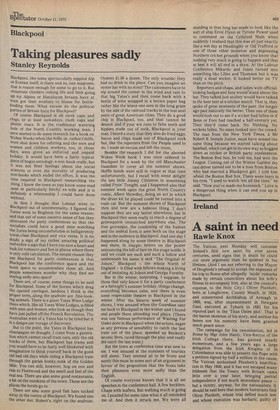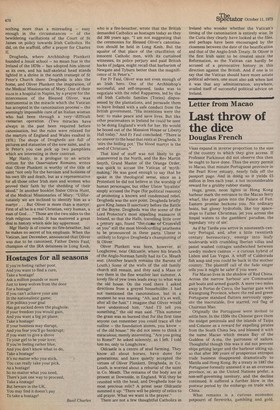Ireland
A saint in need
Rawle Knox
The Vatican next Monday will canonise. Ireland's first new saint for over seven centuries, amid signs that in death he could stir more argument than he quieted in his lifetime. (And I am not referring to the Mayor of Drogheda's refusal to accept the expenses of his trip to Rome after allegedly 'snide' remarks made by certain councillors about his wife's fitness to accompany him, also at the council's expense, to the Holy City.) Oliver Plunkett, born at Loughcrew, County Meath, in 1625, and consecrated Archbishop of Armagh in 1669, was, after imprisonment in Newgate Gaol, executed at Tyburn in 1681 for his reputed part in the 'Titus Oates plot'. That is the barest skeleton of his story, and neither his bones nor his memory have been granted much peace since.
The campaign for his canonisation, led in Rome by Mgr John Hanly, Vice-Rector of the Irish College there, has gained steady momentum, and a few years ago a large delegation from the Irish Knights of St Columbanus was able to present the Pope with a petition signed by half a million in the cause. The Vatican authorised Plunkett's beatification in May 1920, and it has not escaped many Irishmen that the Treaty with Britain came little over a year later, bringing partial independence if not much immediate peace — but a victory, anyway, for the nationalists. It should be said here that modern historians find Oliver Plunkett, whose trial defied much law and whose execution was barbaric, guilty of nothing more than a misreading — easy enough in the circumstances — of the bewildering vacillations of th.e Court of St James on policy towards Irish Catholics. He did, on the scaffold, offer a prayer for Charles Drogheda, where Archbishop Plunkett founded a Jesuit school — no mean feat in the Ireland of the 1670s — has adopted him almost as its own, and his half-skeletal head stands lighted in a shrine in the north transept of St Peter's Church there. Drogheda is also the home, and Oliver Plunkett the inspiration, of the Medical Missionaries of Mary. One of their nuas in a hospital in Naples, by a prayer for the intercession of the Blessed Oliver, was instrumental in the miracle which the Vatican has accepted in the canonisation process — the seemingly impossible cure of an Italian woman who had been through a very difficult caesarian operation. (Two miracles have always in the past been required before canonisation, but the rules were relaxed for the martyrs of England and Wales exalted in 1970.) The shops of Drogheda are full of pictures and statuettes of the new saint, and in St Peter's you can pick up two pamphlets which are interesting in their contrast.
Mgr Hanly, in a prologue to an article written for the Osservatore Romano, writes that Oliver Plunkett is worthy of the title of saint "not only for the heroism and holiness of his own life and death, but as a representative for all those other Irish men and women who proved their faith by the shedding of their blood." In another booklet Sister Olivia Hunt, of the Medical Missionaries of Mary: "Unfortunately we are inclined to identify him as a martyr. . . But Oliver is more than a martyr. First of all he is a real Christian, very human, a man of God ..." Those are the two sides to the Irish religious medal. It has mattered a great deal in history which side lay uppermost.
Mgr Hanly is of course no fire-breather, but he makes no secret of his emphasis. When the Vatican, last December, announced that Oliver was due to be canonised, Father Denis Faul, champion of the IRA detainees in Long Kesh, who is a fire-breather, wrote that the British demanded Catholics as hostages today as they did 300 years ago. "I am not suggesting that the ceremonies for Blessed Oliver's canonisation should be held in Long Kesh. But the squalor of that place of the crucifixion of innocent Catholic men, with its curtained witnesses, its police perjury and paid British hacks of judges, might recall that barbarism of Newgate and Tyburn better than the magnificence of St Peter's."
For Fr Faul, Oliver was not even enough of an Irish hero. One of the Archbishop's successful, and self-imposed, tasks was to negotiate with the rebel Rapparees, led by the old Irish Catholic families (Tories) dispossessed by the plantations, and persuade them to leave Ireland with a safe conduct from the British government. "His intentions were the best: to make peace and save lives. But like other peacemakers in Ireland he could he seen to be doing England's work for her. He would be booed out of the Mansion House or Liberty Hall today." And Fr Faul concluded: "There is no answer to the head that rests at Drogheda. It 'stirs the boiling pot.' The blood martyr is the seed of Christians."
That kind of stuff was not likely to go unanswered in the North, and the Rev Martin Smyth, Grand Master of the Orange Order, was quick to accuse the Vatican of 'mythmaking.' He was good enough to say that he spoke in the theological sense, since as a Protestant he did not believe in the worship of human personages, but other Ulster 'loyalists' simply accused the Pope (for political reasons) of promoting a known and condemned rebel. Drogheda was the sore point. Drogheda briefly gave King James II sanctuary before the Battle of the Boyne. Drogheda was the scene of the Lord Protector's most appalling massacre in Ireland, so that the Halls, travelling little over a sentury ago, found "the cum ,of Cromwtell on pile' still the most bloodcurdling anathema to be pronounced in these parts. Ulster is unlikely to forgive Drogheda's championing of St Oliver.
Oliver Plunkett was born, however, at Loughcrew, near Oldcastle, where his branch of the Anglo-Norman family had its Co. Meath seat. (Another branch remains the Barons of Louth.). Some of the walls of the old family church still remain, and they said a Mass or two there in the fine weather last summer. A lovely file of yew trees leads away to what was the old house. On the road there I asked directions from a greyed householder. I had not mentioned the canonisation, but in a moment he was musing: "Ah, and it's as well, after all the fuss." I imagine that Oliver would have understood him. "And I'll tell you something," the old man said. "This summer the grass was so burned that for the first time anyone can remember you could trace all the outline — the foundation stones, you know — of the old house." He did not seem to think it miraculous; merely interesting. "Are you going to Rome?" he asked solemnly, as I left. I told him no, only to Loughcrew.
Oldcastle is a centre of stud farming. They know all about horses, have done for generations; and have quietly accepted the virtues of Oliver Plunkett. Drogheda, in Co. Louth, is worried about a reburial of the saint in Co. Meath. The remains of the body are at present at Downside, in England. Will they be reunited with the head, and Drogheda lose its most precious relic? A priest near Oldcastle summed it up: "There will be plenty of relics to aid prayer. What we want is the prayer."
There are not a few thoughtful Catholics in Ireland who wonder whether the Vatican's timing of the canonisation is entirely wise. In the Curia they clearly have looked at the files, and perhaps have been encouraged by the closeness between the date of the beatification and that of the Anglo-Irish Treaty. St Oliver is the first Irish saint to be created since the Reformation, so the Vatican can hardly be accused of a provocative history in this direction against the British. And if one is to say that the Vatican should have more astute political advisers, one must also ask when last it was that any administration, anywhere, availed itself of successful political advice on Ireland.



































 Previous page
Previous page